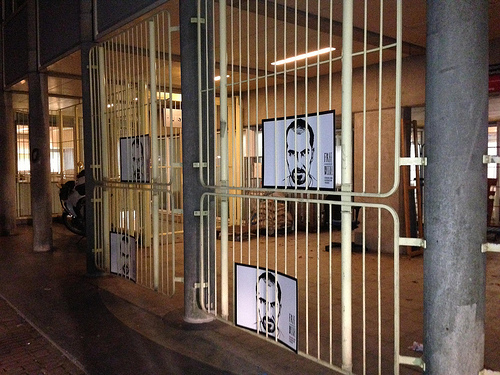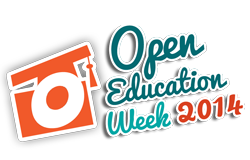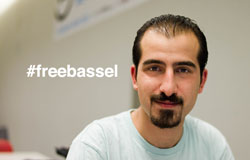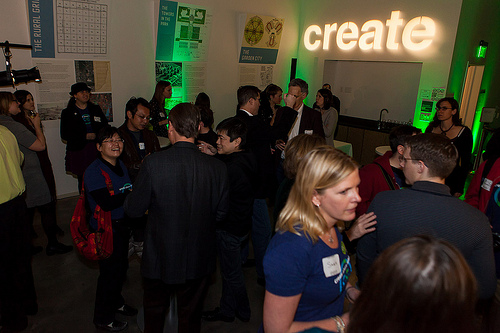Affiliate Project Grant Update: Latin America
mardi 18 mars 2014 à 17:48This is the final installment in our five week blog post series on the Affiliate Team project grants. You’ve heard about projects in Africa, Arab World, Asia-Pacific, and Europe. Today, you’ll hear about projects from our Latin America region, including: a report on the evolution of the academic journals’ presence and dissemination in Chile, a School of Open course for librarians on copyright led by Colombia, El Salvador, and Uruguay, and a free music festival and open source website from Guatemala and Uruguay.

Chile: Promotion of Open Knowledge in the Chilean Academia: Ways to Facilitate Adoption of Creative Commons in the Academic World
by project lead Francisco Vera
In Derechos Digitales, we have been working almost 10 years on copyright and access to knowledge issues, by doing public advocacy on copyright reform and working with Creative Commons licenses to enable all kind of creators to share their works in the digital environment, through the use of these tools.
One of our stronger research lines has to do with scientific and scholarly work, how this knowledge is being disseminated, and how we can improve that process to make this information accessible to everybody interested.
Following that path, since 2008 we have been researching academic journals production and their publishing terms, along with creating legal guides to academics to get a sense of how to use CC licenses and make them able to share their work. That allowed us to publish a couple books with our findings and internal policy recommendations.
Thanks to the CC grant we were awarded, we have been able to resume that work, updating our figures from the 2008 research and taking one step further, conducting field research on the academic community about the way they publish and manage that content, and if they are aware of the CC and Open Access movements.
At this point, we have interviewed scholars from the major Chilean universities in different fields on exact and social sciences to be aware of their perceptions and needs regarding open access. In parallel, we are researching academic publications to determine how the situation has evolved from 2008 to this day, in terms of journal continuity but also in terms of how these deal with publishing formats and licensing terms.
We hope, by April this year, to have a step forward on our diagnosis of the academic dissemination environment, and with more insights of the academic world, a report that speaks on the evolution of the journals’ presence and dissemination. We also hope to have performed a couple workshops with government officers and academic community, in order to boost open access and open licensing initiatives.
Colombia, El Salvador, Uruguay: ABC of Copyright for Librarians
#schoolofopen
by project lead Maritza Sanchez
A CC grant made possible that since August 2013, three Creative Commons chapters -Colombia, El Salvador and Uruguay- are working to adapt an online course for librarians about copyright and with an eye on the Open world.
The project aims to develop the necessary open educational resources (OER) for an online course, self-taught and in Spanish, that will be available through the School of Open, and eventually in the OER projects of the chapters developing the course (i.e. Internet Activa and Artica).
Why Basic Copyright Concepts for Librarians? It is not a secret that many librarians and libraries in Latin America work with little or no knowledge about the copyright frame. We want to offer this target group and other related professionals (e.g. academic researchers, teachers, OER developers, librarian students, archivists, museum workers, all those interested on heritage conservation, etc.) the basic knowledge for their work.
We believe that this knowledge is much needed right now and will also be useful to promote CC licenses among librarians in the region.
The material in this course will be open as a self-guided course that can be tapped on demand — individually, at a user-preferred time and date. Moreover, the course can be harnessed as a group, from a collective or specific institution, to be facilitated according to the possibilities and conditions of a given community.
We are currently finalizing the legal and pedagogical review process of the last module of the course that we have titled, “ABC Copyright.” The legal review ensures the strengthening of self-learning potential of all students, while the pedagogical review is valuable to contextualize accurately and clearly each module to Latin American culture. We are also working on building a communication strategy which will be essential once the course is published at the School of Open for the dissemination to the audience of this open educational material. We have already developed the graphic concept, which we share as a preview in this post! We are at the stage of creating new graphic elements that will complement some of the most complex issues and will make their assimilation much easier.
We are working with love and energy so that very soon all those curious and interested can learn, share and supplement the online course, ABC Copyright for Librarians in Latin America!
Guatemala, Uruguay: Promoting Free Music in Central and South America
by Meryl Mohan (project lead: Renata Avila)
This project, a collaboration between CC Guatemala and Uruguay, was drafted following the suggestions of six bands who are starting to use open licenses in Guatemala. It represents a unique opportunity to reconnect and expand the open license network in the Latin American music community, consisting of an open call for free music followed by a week dedicated to festivals and concerts in multiple jurisdictions. Each country will have at least ten bands participating, and is combined with training for musicians, producers, artists, and copyright experts to explain artists’ rights, how copyright law affects music, and the power of sharing. The activities will be posted on an open source website filled with the LP of Latin American free music, photos and videos of the workshop, a free music declaration, and showcase of successful cases in Latin America and all the activities of the free music week. Since it’s open source, anyone can use it to recreate the same project in their region or country.










